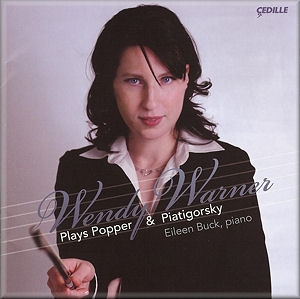 |
 |
|


alternatively
CD: AmazonUK
AmazonUS
Download: Classicsonline
|
Wendy Warner Plays Popper and Piatigorsky
David POPPER (1843-1913)
Suite for Cello and Piano, Op. 69 [27:34]
Three Pieces, Op. 11 [12:37]
Im Walde, Op 50. [23:06]
Gregor PIATIGORSKY (1903-1976)
Variations on a Theme of Paganini [16:02]
 Wendy Warner (cello); Eileen Buck (piano)
Wendy Warner (cello); Eileen Buck (piano)
rec. 27-31 August, 2007 (Popper Opp. 11 and 69), 26-27 June, 2008
(Popper Op. 50 and Piatigorsky), Fay and Daniel Levin Performance
Studio, Chicago, Illinois, USA
full price
 CEDILLE RECORDS CDR 90000 111 [79:15]
CEDILLE RECORDS CDR 90000 111 [79:15] 
|
|
|
David Popper did not set out to become the Liszt of the cello.
When he arrived at the Prague Conservatory at age 12, in the
year 1855, he was an aspiring violin virtuoso, but the school
had too many violin students and Popper was assigned to cello
lessons instead. “Within a few years”, the booklet-notes for
this new CD tell us, he was “regularly substituting for the
official cello professor”. In a few years more, Popper became
lead cellist of the Vienna Philharmonic. His career as a composer-performer
lasted for several highly distinguished decades.
This disc is my first introduction to Popper, who evidently
wrote four cello concertos (only one has been recorded), a requiem
for three cellos and orchestra, and a suite of forty études
which was recently recorded for Naxos by Dmitry Yablonsky. The
Suite for cello and piano, Op. 69, opens with a memorable
theme in the style of a cheerful Brahms. It is an immediately
appealing piece, with charming melodies at every turn and a
marvelously singing cello part. The best stylistic comparison
I can make is to suggest the very happy combination of Germanic
formal structure and the amiable, tune-laden cheeriness of Popper’s
contemporary and countryman Dvorák. Only in the slow-movement
ballade do clouds appear on the horizon, but the finale dispels
them with rapid, light-hearted passagework for the cello.
The early Three Pieces, Op. 11, are highlighted by a
witty humoresque and a piquant, danceable mazurka. Im Walde,
Op. 50, runs the gamut of typical romantic-era forest images,
from the rhapsodic opening to the “Dance of the Gnomes”, which
features a devilish piano part sounding rather like Schumann,
or Grieg’s “March of the Trolls”. Even amid the gnomes’ revelry,
though, Popper can’t resist inserting a lyrical central passage.
Further highlights of the suite include the soft, reverent closing
of the “Devotion”, the very Dvorákian opening tune of the round
dance, and the whistling cello harmonics which bring the same
dance to its end.
Gregor Piatigorsky is another composer-performer in the Popper
tradition, but from the next century over, and with a greater
emphasis on virtuosic effect. He wrote his Paganini Variations
(yes, they’re on That Tune) in 1946, and each variation is modeled
after the style of a colleague or friend. Some are cellists
– the first variation is Pablo Casals, and the eleventh is Gaspar
Cassadó – but the collection is a diverse one: Paul Hindemith,
Yehudi Menuhin, Nathan Milstein, Fritz Kreisler, Jascha Heifetz
and even Vladimir Horowitz inspired variations based on their
musical personalities. The Kreisler variation is light and frothy,
like one of his encores; the Milstein is a silky-smooth virtuoso
piece at near light-speed; the Horowitz is a highly dramatic
ninety-second crescendo which brings the piece to a forceful
conclusion. All of them are enjoyable, and thankfully Piatigorsky
is quite creative in the ways he chooses to vary this all-too-familiar
theme. I never tired of hearing it crop up again in a new disguise.
Wendy Warner is a superb cellist capable of meeting all of Piatigorsky’s
technical demands. She plays two instruments on this recording,
and the 1772 Gagliano used in the Suite, Op. 69 has a
particularly rich sound. But it is Warner who really shines,
attuning her playing especially well to Popper’s indulgent,
tuneful celebrations of the beauty of the cello’s sound. Listening
to this recording of the Suite, in particular, one can
understand why Pablo Casals remarked that “no other composer
wrote better for the instrument” than David Popper. Neither
Popper nor Warner is capable of making the cello sound ugly.
Eileen Buck deserves credit for her piano accompaniment, too,
although she really only becomes an equal partner in the music
during the Popper “Gnome Dance” and some of the Piatigorsky
variations. She certainly knows when to let the cello do the
work and when to take up the argument with equal force. I wish
I could say the same for the engineers; the piano is rather
backwards in the mix, although this is just taking a cue from
the balance the composers themselves put into place.
One can imagine these performances being bettered some day –
say, with more wit in the fourth movement of Im Walde
or in the humoresque – but the odds are slim, especially because
there are almost no other recordings of this repertoire to speak
of. In my imagination I relish the possibility that Wendy Warner
and Eileen Buck will go on to record several more recitals of
music by these composers. David Popper’s Pieces Opp. 54, 55,
and 64 await, as do his four concertos. More, please!
Brian Reinhart
see also review by Jonathan
Woolf
|
|















